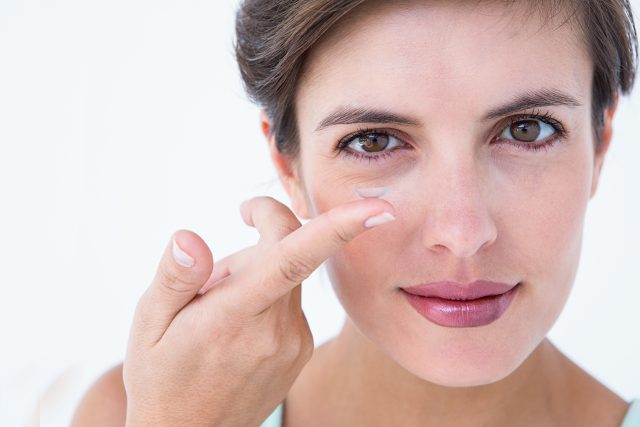In our eye care clinic in Old Bridge, we prescribe many different types of contact lenses, from basic standard contact lenses, to more complex and specialty lenses. There are lenses specifically for children, for teens, and for adults. Our Old Bridge optometrist listens carefully to find out what your specific vision needs so we can help you solve them.
Many people are surprised to learn there are so many different types. Most people only know about soft lenses and may have heard about gas permeable lenses.
There are contact lenses for people that:
- are Nearsighted (Myopia)
- are Farsighted (Hyperopia)
- need Bifocals or Progressive eyeglasses, and want to be able to see both distance and near (Presbyopia),
- have Astigmatism.
We have solutions to provide:
- Vision Rehabilitation after LASIK and
- Vision correction without surgery.
Each type of lens has its advantage. Soft Contact Lenses are very popular because they are comfortable almost immediately. Gas Permeable contact lenses have the advantage of sharper clearer vision, longer life, better eye health, and are easier to care for. Together we will figure out what you need and what will work best for you. Some people are driven by comfort and that is their higher priority. For others, particularly those who have dry eye due to contact lens wear, other lenses work better. People who have a higher need for sharper vision, particularly on the computer, may benefit from gas permeable lenses.
Soft contact lenses
- Daily Disposables - A new fresh health pair... Every Day!
- Other Disposables - 1 & 2 Week Disposables, 1 & 3 Month Disposables
- Soft Bifocal Lenses to enable you to see at distance and at near. At about 40, people start to notice some difficulty seeing at near (reading or computer distance) through their contact lenses that they had needed only for distance until then.
- Special lenses for people who have the Dry eye, Keratoconus, damage after LASIK surgery
- Prosthetic Lenses - To improve appearance after injury or congenital problems
Gas Permeable contact lenses
Gas Permeable (GP) contact lenses have many benefits and are often better than soft lenses because they provide sharper vision and a more stable and accurate correction of astigmatism. they have the advantage of allowing more oxygen into the eye and are often a healthier system. They are easier to insert and remove since they are smaller. they also have the advantage of lasting longer. one of the nicest features, especially for children, is that they slow the progression of nearsightedness in most children. The gas peremeable lens material is used for orthokeratology, where specially designed contacts are worn during sleep to reshape the cornea and improve vision.
Some people are more driven by the sharpness and clarity and others are more driven by comfort. The good news is that we can meet what your demands are.
Tell me more about Disposable Contact Lenses
All lenses are disposable. They just differ in how often you dispose of them. The major advantage of Soft Contact Lenses is that they are comfortable almost immediately. All soft lenses, however, become coated with your tears, mucin, lipid, protein, etc. The bottom line is that they become dirty. Years ago, they started out as a pair was intended to last a year, but what we found is that as people wore their lenses longer, they had more problems. That is why most soft lenses are disposed of on a regular basis;
- daily,
- 2 week,
- 1 month,
- 3 months.
Soft lenses are FDA approved to be worn every day and to be replaced after a specific time, for example, there are lenses that are approved for 2 weeks, for a month, for 3 months, and then you begin with a new one. Lenses that are worn as extended wear (worn during the day and at night while sleeping) cause more problems than lenses that are either worn only during the day or lenses such as orthokeratology molding lenses that are only worn at night.
Soft lenses that are not daily disposable lenses must be cleaned after every use. As lenses get older, there are more deposits from your own tears that stay on the contact lens. When someone wears a lens for longer than they are approved for, then problems associated with contact lens over-wear can occur.




Appointment times may vary so call us for availability.